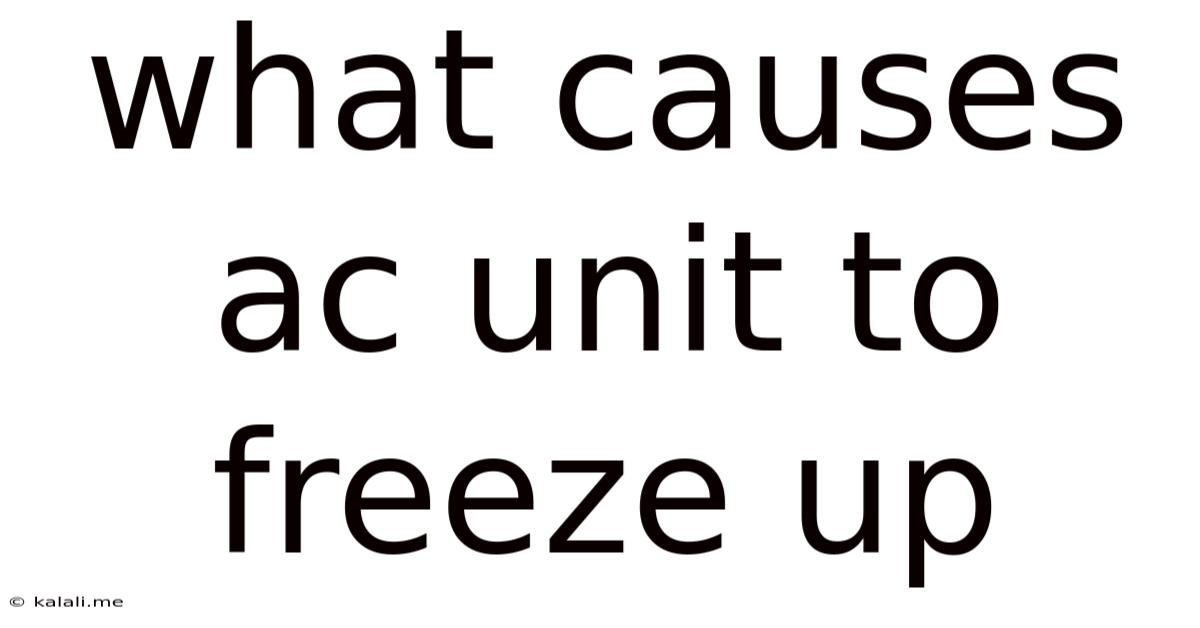What Causes Ac Unit To Freeze Up
Kalali
Jun 10, 2025 · 3 min read

Table of Contents
What Causes an AC Unit to Freeze Up? A Comprehensive Guide to Troubleshooting Frozen AC Units
A frozen AC unit is a frustrating problem, leaving you sweltering in the heat while your air conditioner is effectively useless. This article will delve into the common causes of a frozen AC unit, helping you diagnose the issue and potentially avoid costly repairs. Understanding the underlying problem is key to preventing future freeze-ups and ensuring efficient cooling.
Understanding the Cooling Cycle: Why Freezing Occurs
Before we explore the causes, it's crucial to understand how an air conditioner works. The process relies on a refrigerant that absorbs heat from your home and releases it outside. This refrigerant changes states, going from a liquid to a gas and back again. A frozen evaporator coil signals a disruption in this delicate balance, usually stemming from inadequate airflow or low refrigerant levels.
Common Culprits Behind a Frozen AC Unit
Several factors contribute to a frozen AC unit. Let's break them down:
1. Restricted Airflow: This is the most frequent culprit. Inadequate airflow prevents the evaporator coil from properly absorbing heat, causing it to freeze. Several things can restrict airflow:
- Dirty Air Filter: A clogged air filter is the most common cause of restricted airflow. A dirty filter restricts air circulation, leading to ice formation on the evaporator coil. Regular filter cleaning or replacement is essential for preventative maintenance.
- Frozen Evaporator Coil: The freezing itself can further restrict airflow, creating a vicious cycle.
- Blocked Vents: Obstructed vents, either inside or outside the house, limit airflow. Ensure all vents are clear and unobstructed.
- Frozen Drain Line: A frozen drain line can cause a backup of condensation, leading to ice formation. This is more common in colder climates.
- Damaged Blower Motor: A malfunctioning blower motor won't circulate air effectively, contributing to freezing.
2. Low Refrigerant Levels: Refrigerant is essential for the cooling process. If the refrigerant level is low, the evaporator coil won't absorb enough heat, leading to freezing. Leaks in the refrigerant lines are a common reason for low refrigerant levels, requiring professional repair. Never attempt to recharge refrigerant yourself; it requires specialized equipment and knowledge.
3. Dirty Condenser Coils: While less directly related to freezing the evaporator coil, dirty condenser coils (the outdoor unit) reduce efficiency. A less efficient system may struggle to maintain the proper temperature differential, indirectly impacting the evaporator coil and potentially leading to freezing.
4. Electrical Issues: Problems with the fan motor, capacitor, or other electrical components can disrupt the cooling cycle and cause freezing. These require professional diagnosis and repair.
5. Incorrect Thermostat Settings: While less common, an improperly calibrated or malfunctioning thermostat can lead to inconsistent cooling, potentially causing ice buildup.
Troubleshooting and Solutions
- Check the Air Filter: This is the first step. Replace or thoroughly clean the filter.
- Check the Airflow: Ensure vents are clear and unobstructed.
- Inspect the Evaporator Coil: If you're comfortable with DIY repairs, you might check for ice buildup on the coil (turn off the unit before doing so!). However, unless you're experienced with AC units, it is best to call a technician.
- Examine the Drain Line: Ensure the drain line is clear and free of blockages.
- Call a Professional: For low refrigerant, electrical issues, or if you're uncomfortable performing any repairs yourself, call a qualified HVAC technician. They possess the tools and expertise to diagnose and resolve the problem safely and effectively.
Preventing Future Freeze-Ups:
- Regular Maintenance: Schedule regular maintenance checks to catch minor issues before they escalate.
- Clean Air Filters Regularly: Replace or clean air filters every month during peak cooling season.
- Inspect Coils: Periodically inspect both the evaporator and condenser coils for debris and clean as necessary.
- Proper Installation: Ensure your AC unit is professionally installed to optimize efficiency and airflow.
By understanding the causes of a frozen AC unit and implementing preventative measures, you can ensure a cool and comfortable home throughout the summer. Remember, prompt attention to any issues can prevent major repairs and ensure your air conditioner runs efficiently for years to come.
Latest Posts
Latest Posts
-
What Is The Fine For Killing A Buzzard
Jul 01, 2025
-
How Old Am I If I Was Born In 1996
Jul 01, 2025
-
What Is 3 X 3 X 3
Jul 01, 2025
-
How Many Apples In A 3 Pound Bag
Jul 01, 2025
-
How Many Pounds Is A Bushel Of Peanuts
Jul 01, 2025
Related Post
Thank you for visiting our website which covers about What Causes Ac Unit To Freeze Up . We hope the information provided has been useful to you. Feel free to contact us if you have any questions or need further assistance. See you next time and don't miss to bookmark.